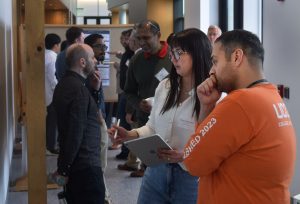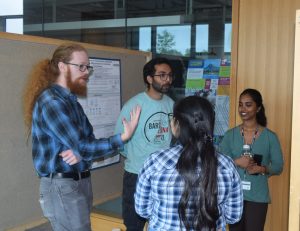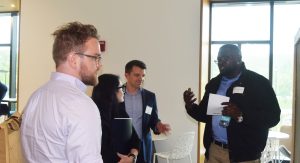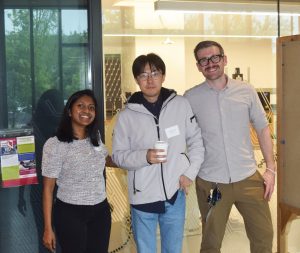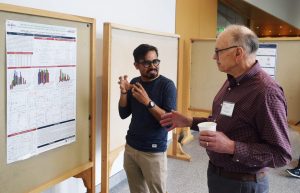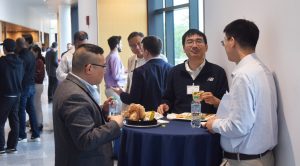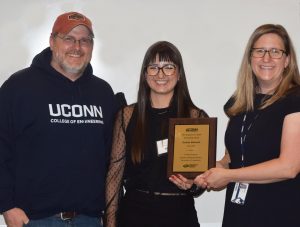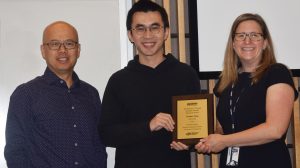The 2025 Graduate Student Poster Session took place on May 22 to coordinate with the IMS Industrial Affiliate Program annual meeting. IAP members and partners participating in the event were able to meet with students to learn about the recent research in IMS labs. Twenty four students from 6 different degree programs presented posters at the event. Materials Science Ph.D. student, Abbas Ahmed, received an award for the best poster.
Uncategorized
Zhang Group Researchers Published in Nature Communications
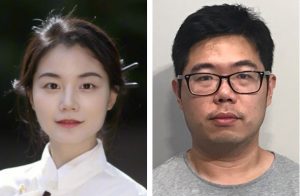
The Yi Zhang research group paper, “Liquid-based encapsulation for implantable bioelectronics across broad pH environments”, was published in Nature Communications, in January, 2025.
Wearable and implantable bioelectronics that interface with various biological tissues and environments have a wide range of applications, including pain management, electrophysiological mapping and stimulation of cardiac tissue, and gastrointestinal monitoring and modulation. These biological tissues and environments span a broad pH range, from the highly acidic conditions in the gastrointestinal system (as low as pH 1.5) to the alkaline environment of chronic wounds (up to pH 8.9). The encapsulation of these systems, however, presents a major challenge, as such devices require superior barrier performance against water and ion penetration in challenging pH environments while also maintaining flexibility and stretchability to match the physical properties of the surrounding tissue. Current encapsulation materials are often limited to near-neutral pH conditions, restricting their application range. Here, Yi Zhang lab from the Institute of Materials Science and Biomedical Engineering Department reports a liquid-based encapsulation approach that achieves year-long encapsulation performance for wireless optoelectronics under highly acidic conditions (pH 1.5–4.5). This approach also achieves high optical transparency, stretchability, and mechanical durability. This liquid-based encapsulation strategy is broadly applicable to a range of implantable bioelectronics, particularly in challenging acidic or alkaline conditions.
Congratulations to first co-authors, Xiaoting Xue and Xincheng Zhang, of the Zhang Research Group.
IMS Polymer Program Honors Two Ph.D. Students
Jiuzhou Zhao Completes Ph.D. in Polymer Science

After completing his Master’s degree at Akron University, Jiuzhou joined the UConn Polymer Ph.D. Program. Under the advisement of Professor Fotios Papadimitrakopoulos, he explored the world of polymer coatings, leading to his dissertation: “Layer-by-layer Assembled Polamide for Endogenous Redox-Active Interference Molecules Rejection”.
Jiuzhou returned home in China to begin a research and development position in the petroleum industry.
Congratulations Jiuzhao!
Chromogenic Identification of Breakdown
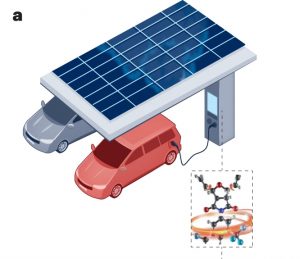 Professors Greg A. Sotzing and Pritish S. Aklujkar have been working with high temperature dielectrics used in high energy density capacitors. They are developing a new generation of all-organic polymer dielectric capacitors that can withstand high temperature conditions, eliminating the need for coolant systems. These capacitors will have a number of applications, including electric-vehicle charging stations and Electromagnetic Aircraft Launch Systems (EMALS) used to catapult jets from aircraft carriers. Their paper, “Chromogenic Identification of Breakdown” was published in Nature Materials, February, 2, 2024. Visit Nature Materials to read the complete article.
Professors Greg A. Sotzing and Pritish S. Aklujkar have been working with high temperature dielectrics used in high energy density capacitors. They are developing a new generation of all-organic polymer dielectric capacitors that can withstand high temperature conditions, eliminating the need for coolant systems. These capacitors will have a number of applications, including electric-vehicle charging stations and Electromagnetic Aircraft Launch Systems (EMALS) used to catapult jets from aircraft carriers. Their paper, “Chromogenic Identification of Breakdown” was published in Nature Materials, February, 2, 2024. Visit Nature Materials to read the complete article.
Polymer Ph.D. Program Welcomes Vishwa Suthar and Hoang-Phuc Pham
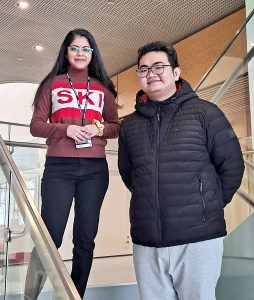
The IMS Polymer Program welcomed two incoming Ph.D. students this year, Vishwa Suthar and Hoang-Phuc Pham. Originally from western India, Vishwa Suthar came to the United States to complete her Master of Science degree at Pittsburg State University. She joined the UConn Polymer Ph.D. Program beginning the Fall 2023 session. Originally from Vietnam, Hoang-Phuc Pham completed both Bachelor and Master of Science degrees at the National Taiwan University of Science and Technology. He joined the UConn Polymer Ph.D. Program beginning the Spring 2024 session.
Chung-Hao Liu Completes his Polymer Ph.D.
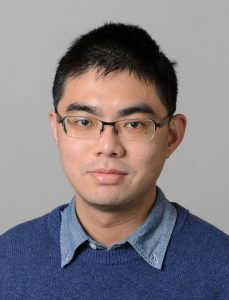
After completing his BS and MS in Taiwan, Chung-Hao Liu came to the US to join UConn’s Polymer Ph.D. Program. He worked under the guidance of Prof. Mu-Ping Nieh to learn the principles of self-assembly and structural characterization using neutron, x-ray, and light scattering. Chung-Hao was a productive student in scientific output with 3 lead-author, and 14 coauthored publications in prestigious peer-reviewed journals (including Journal of American Chemical Society, Angewandte Chemie, Advanced Functional Materials, Journal of Colloid and Interface Science, Nanoscale, Macromolecules, ACS Macro Letters, etc.) and more to come.
Reflecting on his experience at UConn, Chung-Hao says he loved the collaborative nature of the Institute of Materials Science with both faculty and students. The interdisciplinary research projects allowed him to speak with chemists and engineers from various backgrounds. He also noted that faculty were always open to providing help whenever he encountered problems. Chung-Hao also enjoyed freedom in research the pursuit of research projects without being micromanaged.
Chung-Hao completed his dissertation defense, “Encapsulation and Polymerization in the Fluid Phase of a Well-Defined Bicellar Template,” in spring 2023 and has started his new journey as a postdoctoral scientist in the Oak Ridge National Laboratory, Tennessee, in July 2023.
Amy Pollock Receives Future Climate Venture Studio Fellowship

UConn’s Future Climate Venture Studio has created a fellowship program designed to provide tangible experiences for students interested in learning in start-ups, marketing, commercialization, venture development, and research around climate change. Materials Science PhD. student, Amy Pollock, is one of three UConn graduate students to receive the fellowship. Fellows were selected for their excellent writing skills, science, technical, or business background, interest in the entrepreneurial process, interest in addressing climate change, and their ability to work independently and handle confidential material. The program partners each student with 2 start-up companies that need advice and/or assistance within a specific discipline. This enables the companies to have access to scientist working in their field while the students gain insight regarding the many challenges of creating and maintaining a startup company. The program is one more example of UConn’s support of entrepreneurship for both students as well as faculty.
Amy will be working with the following companies:
- Peat (formally, “Afterlife”) – [eliminating food waste]: https://www.peatfarming.com/
- Homeostasis – [Carbon removal & utilization]: https://www.homeostasis.earth/
Details regarding the Future Climate Venture Studio and the fellowship can be found at: https://www.futureclimateventurestudio.com/
Polymer Program Student Receives Henkel Internship
 Polymer Ph.D. student, Abhirup Dutta, received an internship with Henkel Corporation during the summer of 2021. He worked in product development R&D with their adhesives team performing synthesis, formulation, and application testing of novel isocyanate free polyurethane based reactive hot-melt adhesives for engineered wood applications.
Polymer Ph.D. student, Abhirup Dutta, received an internship with Henkel Corporation during the summer of 2021. He worked in product development R&D with their adhesives team performing synthesis, formulation, and application testing of novel isocyanate free polyurethane based reactive hot-melt adhesives for engineered wood applications.
Abhirup states the overall experience was a great exposure to research and development of industrial significant materials like adhesives and coatings. It provided the opportunity to apply fundamentals of polymer chemistry to materials development while meeting product and cost requirements. This experience helped him better prepare for a materials/polymer scientist role in industry.
Henkel, an international chemical corporation, has offered internships and employment of many UConn alumni in past years. While they have a production plant and offices in Connecticut, Abhirup was in the Bridgewater, NJ facility.
Abhirup found the internship on the Handshake job portal, managed by UConn’s Center for Career Development. https://career.uconn.edu/resources/handshake/
Dr. Ying Li is “Targeting Tumors with Nanoworms”
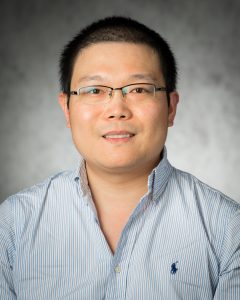 Dr. Ying Li is using computers and artificial intelligence to improve delivery of nanomedicines to tumors. “A lot of medicines involve intravenous injections of drug carriers,” said Ying Li, an assistant professor of Mechanical Engineering at the University of Connecticut. “We want them to be able to circulate and find the right place at the right time and to release the right amount of drugs to safely protect us. If you make mistakes, there can be terrible size-effects.”
Dr. Ying Li is using computers and artificial intelligence to improve delivery of nanomedicines to tumors. “A lot of medicines involve intravenous injections of drug carriers,” said Ying Li, an assistant professor of Mechanical Engineering at the University of Connecticut. “We want them to be able to circulate and find the right place at the right time and to release the right amount of drugs to safely protect us. If you make mistakes, there can be terrible size-effects.”
Dr. Li’s research is featured in an story from the Texas Advanced Computing Center at the University of Texas Austin. Read the complete article from Texas Advanced Computing Center.
